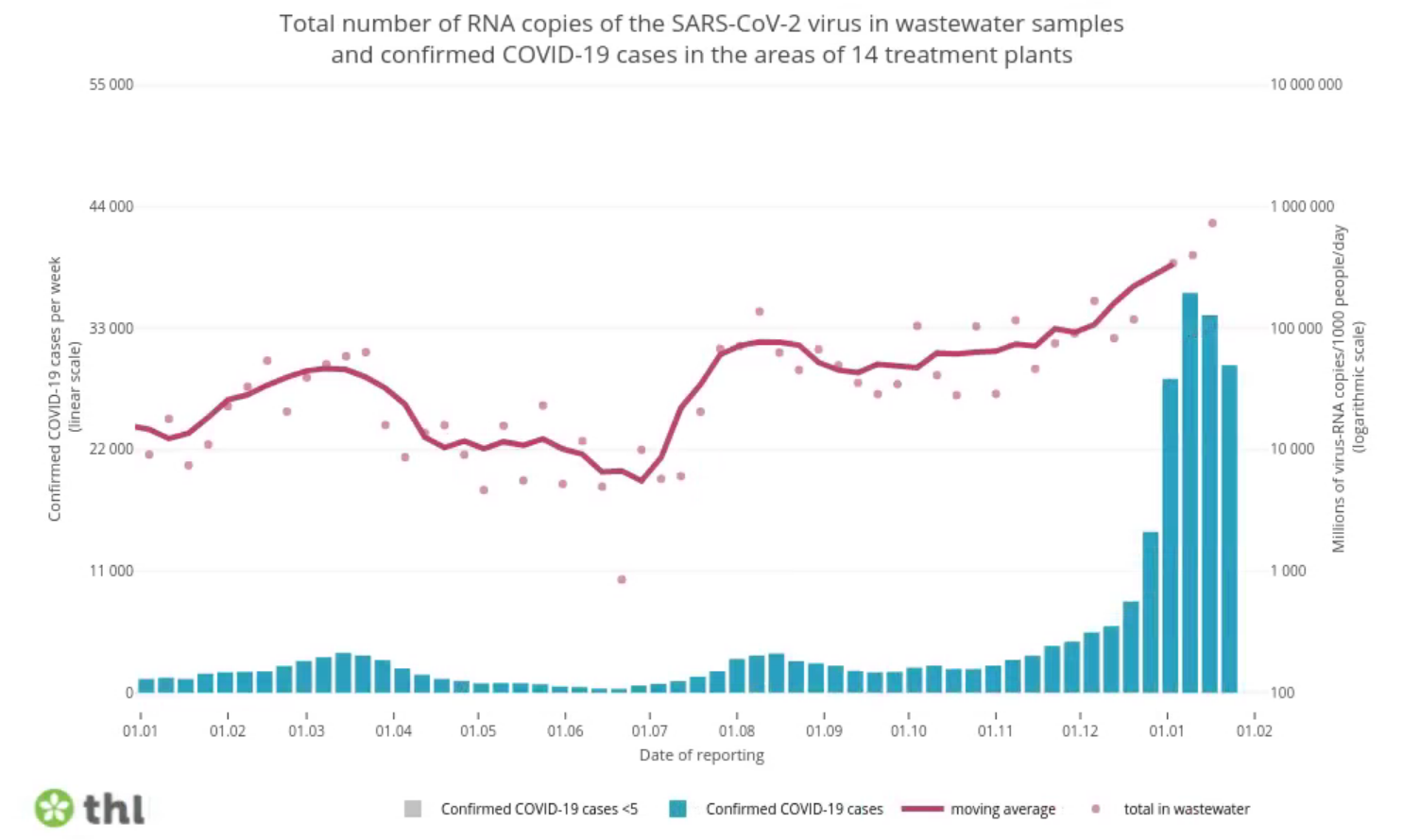Coronavirus variants can now also be identified in wastewater – first Omicron detections in the December samples
The Finnish Institute for Health and Welfare's (THL) wastewater monitoring is expanded to the identification of coronavirus variants from wastewater samples. The identification of coronavirus variants in wastewater is possible with advanced sequencing techniques, even though Coronavirus’s genetic material, viral RNA, is diluted in wastewater and may be damaged by environmental factors. THL began developing a method for identifying coronavirus variants from wastewater samples at the end of last year.
The first confirmed detection of the Omicron variant in Finnish wastewater was obtained from an untreated wastewater sample from the Suomenoja wastewater treatment plant in Espoo. It was collected on the Finnish Independence Day week between 6 and 7 December 2021.
There were also indications of the Omicron variant in the wastewater of Helsinki, but the detection remained uncertain. A detection of the Omicron variant was confirmed from the sample collected from the Viikinmäki wastewater treatment plant in Helsinki on 12–13 December 2021.
There were further detections of the Omicron variant in the samples collected in the following week between 19 and 20 December 2021. The variant was found in the wastewater treatment plants in Helsinki’s Viikinmäki in the Helsinki and Uusimaa Hospital District, Tampere’s Viinikanlahti in Pirkanmaa, Joensuu’s Kuhasalo in North Karelia, Pori’s Luotsinmäki in Satakunta and Turku’s Kakolanmäki in Southwest Finland. An Omicron variant detection in a wastewater sample collected from Kuopio’s Lehtoniemi treatment plant in North Savo remained uncertain. The Omicron variant has not been detected in the previous weeks or other monitored localities.
Further reading: Coronavirus variants in wastewater
The preliminary Omicron variant wastewater findings occur at the time when the Omicron variant’s proportion of diagnosed coronavirus infections began to increase among the population in the area before Christmas. According to the Finnish National Infectious Diseases Register, a total of 20 Omicron variant infections confirmed by sequencing have been diagnosed in the test positive samples collected by 5 December 2021. Nine of the infections were in the Helsinki and Uusimaa Hospital District and 11 in other hospital districts.
In November, all coronavirus variants detected in wastewater represented the Delta variant. In the wastewater examined in December, at first only the Delta variant could be detected and, later, the Omicron variant alongside it.
On 2 December 2021, THL reported the first coronavirus infection caused by the Omicron variant after which infections caused by the variant have been confirmed to an increasing extent. At the moment, the Omicron variant is becoming or has already become the dominant virus in the majority of regions.
Currently, the variant identification method only produces preliminary results from wastewater, and a sequencing delay of up to one month slows down the completion of results.
Not all collected wastewater samples have yet been analysed for coronavirus variants. The next sequencing results will be obtained in February at the earliest. The results concern the situation in different localities at the beginning of January.
Wastewater monitoring continues weekly
After the turn of the year, wastewater monitoring samples have been collected during three weeks already. Based on the latest wastewater samples collected between 16 and 17 January 2022, the total number of coronavirus RNA in wastewater continues to increase.
On the basis of the last five measurements, coronavirus RNA numbers have continued rising in most of the examined wastewater treatment plants.
In Espoo, Helsinki, Hämeenlinna, Joensuu, Kuopio and Vaasa, the number of viral RNA copies per 1,000 people per day is the highest ever recorded for the second week in a row.

The total number of RNA copies of the SARS-CoV-2 virus in wastewater samples and confirmed COVID-19 cases in the areas of 14 treatment plants.
The numbers of coronavirus observed by wastewater monitoring are independent from clinical testing activity, and wastewater monitoring supports other epidemic indicators.
The coronavirus RNA numbers are examined weekly from the wastewater samples of 13 localities: The wastewater treatment plants in Espoo, Helsinki, Hämeenlinna, Joensuu, Jyväskylä, Kouvola, Kuopio, Lappeenranta, Oulu, Pori, Tampere, Turku and Vaasa. In addition, a sample is collected from Rovaniemi every two weeks.
The coronavirus RNA numbers detected in the samples are updated to the weekly report on wastewater monitoring on THL’s website once a week on Fridays at 12:00. Wastewater samples in which coronavirus RNA is detected are sent for sequencing for coronavirus variants.
Further information
- Further information on coronavirus variants in wastewater
- Further information on coronavirus variants
- THL’s press release 2 December 2021 Coronavirus infection caused by the Omicron variant has been detected in Finland
- THL’s press release 7 December 2021 Two new Omicron infections diagnosed in Finland – cases in 50 countries already
- THL’s press release 19 January 2022 Nearly 55,500 new COVID-19 cases in Finland in a week, burden on specialised healthcare still high
- Weekly report on wastewater monitoring for coronavirus (in Finnish)Link to an external websiteOpens in a new tab
Tarja Pitkänen
Chief Specialist
THL
tel. +358 29 524 6315
firstname.lastname@thl.fi
Anssi Lipponen
Senior Researcher
THL
tel. +358 29 524 7962
firstname.lastname@thl.fi



